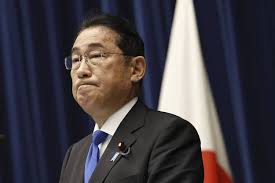
In a surprising turn of events, Japan’s Prime Minister Fumio Kishida has announced his intention to resign, setting the stage for a leadership transition in the world’s third-largest economy. The decision comes amid growing challenges both domestically and internationally, and has sparked a flurry of speculation about who might succeed him.
Kishida’s Decision to Step Down
Prime Minister Kishida’s decision to resign has taken many by surprise, as his tenure, though brief, has been marked by significant efforts to navigate Japan through a series of crises. Kishida cited personal reasons and a need for fresh leadership to tackle the country’s evolving challenges as key factors behind his decision.
During his time in office, Kishida has faced a multitude of issues, including the ongoing impact of the COVID-19 pandemic, economic stagnation, and rising regional tensions, particularly with China and North Korea. Despite his efforts to address these issues, his approval ratings have been on a downward trajectory, influenced by public dissatisfaction with his handling of the economy and social issues.
See Here:
Potential Successors and Political Dynamics
With Kishida’s resignation, attention has quickly turned to potential successors within the ruling Liberal Democratic Party (LDP). Several prominent figures are being discussed as possible candidates, including former Prime Minister Shinzo Abe’s allies and other key members of the party.
Among the frontrunners are Taro Kono, the current Minister of Digital Transformation and a popular figure known for his reformist views, and Shigeru Ishiba, a veteran politician and former defense minister with a strong following within the party. The leadership race is expected to be highly competitive, as various factions within the LDP jockey for influence.
The new leader will need to secure the support of both the party and the public, a task that may prove challenging given the current political climate. The LDP’s internal dynamics, along with public opinion, will play a critical role in determining the outcome of the leadership race.
Challenges Facing the Next Prime Minister
Whoever succeeds Kishida will inherit a host of challenges. Japan is grappling with economic issues, including sluggish growth, an aging population, and a burgeoning national debt. The next prime minister will need to implement effective economic policies to revive growth while managing fiscal constraints.
Additionally, Japan’s security environment has become increasingly precarious, with rising tensions in the Asia-Pacific region. The new leader will need to navigate complex relationships with China, North Korea, and other regional powers while maintaining strong ties with the United States.
Domestic social issues, such as income inequality, labor reforms, and the country’s declining birthrate, will also require urgent attention. The new prime minister will need to balance these pressing concerns with the need to maintain public support and political stability.
Impact on Japan’s International Relations
Kishida’s resignation could have significant implications for Japan’s international relations. As a key ally of the United States and a major player in the Asia-Pacific region, Japan’s leadership transition will be closely watched by the international community.
Kishida has played a central role in Japan’s foreign policy, particularly in strengthening ties with the U.S. and other democratic allies. The new leader will need to continue these efforts while addressing regional security concerns and promoting Japan’s interests on the global stage.
How the next prime minister handles relations with China, North Korea, and other neighboring countries will be critical in shaping the future of Japan’s foreign policy. The leadership change could also impact ongoing negotiations on trade, security, and environmental issues.
Conclusion: A Pivotal Moment for Japan
Prime Minister Kishida’s resignation marks a pivotal moment for Japan, as the country prepares for a leadership transition amid a period of significant challenges. The outcome of the forthcoming leadership race will have far-reaching implications for Japan’s domestic policies, international relations, and its role on the global stage.
As the LDP prepares to select a new leader, the nation and the world will be watching closely to see how Japan navigates this critical juncture. The next prime minister will face immense pressure to deliver on both domestic and international fronts, making this leadership change one of the most consequential in recent Japanese history





